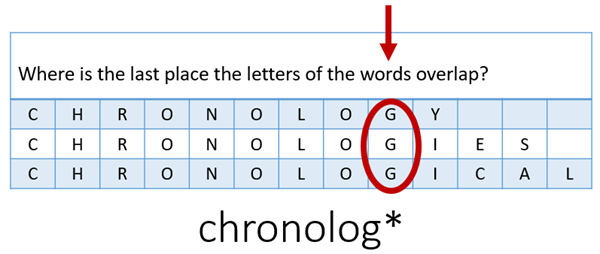3.9 Truncation: Getting Useful Variations of Terms
Truncation means to cut something off. When searching with keywords (as opposed to searching by exact phrase, exact author name, or exact title), you can use an asterisk (*) to truncate, or shorten, a word. Using a truncation symbol allows you to get different forms of your search terms in a single search. For example:
tchaikovsk* ………. retrieves tchaikovskii, tchaikovskij, tchaikovsky
simulat* ……………..retrieves simulate, simulates, simulated, simulation, simulator, etc.
psycholog* ………..retrieves psychology, psychologist, psychological, etc.
method* …………….retrieves method, methods, methodology, methodological, etc.
Why is truncation important? Well, you could do separate searches on the words psychology, psychologist, psychologists, psychological, and all the other variations. Or, you could combine all of these using Boolean OR – as in: psychology OR psychologist OR psychologists OR psychological. However, both of these methods can be time-consuming. Truncation allows you to simplify your search and retrieve other relevant variations of your term(s) that you didn’t even know you needed.

Combining a truncated word with additional search terms using Boolean operators can be especially powerful. For example:
tchaikovsk* AND biography………. retrieves biographies of Tchaikovsky, regardless of how his last name has been transliterated (Tchaikovsky, Tchaikovskii, etc.)
simulat* AND computer…………….. retrieves works about computer simulations, simulators, etc.
Also be sure to truncate your word in a logical place. Insert the asterisk at the point where useful variations will occur in your term. For example, if you were looking for a chronology or chronologies of American history, you might want to truncate the term chronology as follows:
Truncating your term too early (i.e., before it is unique enough) will increase the likelihood that you’ll retrieve irrelevant results. Truncating too late (i.e., after useful variations might occur) negates the whole purpose of retrieving useful variations. Take a look:
chro* ……Too early! This will produce way too many irrelevant results – chromatic, chromatography, chrome, chromosome, chronic…etc.!
chronologi* ……Too late! This will retrieve chronologies, chronological, etc. but NOT the also relevant terms chronology, chronologue, etc.
When you’re considering your search terms, take a few moments to reflect on whether truncation will be a useful technique for your search. It might be a good time-saver for you and an effective way to increase your relevant results.
